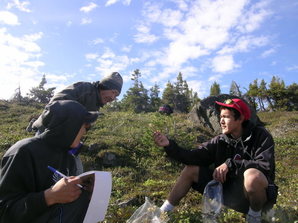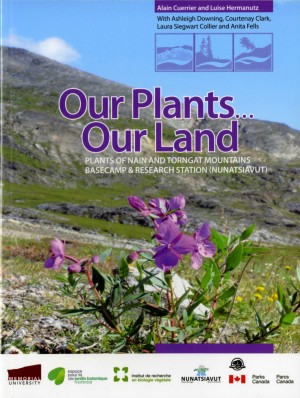Nain, Nunatsiavut

Year(s) Funded: 2010-2011
Topic Area: Food Security Contact: Department of Lands and Natural Resources, Nunatsiavut Government Partners: Nain Inuit Community Government, Nunatsiavut Government Website: http://www.nunatsiavut.com/department/lands-natural-resources Title: The Development of an Inuit Focused Ecohealth Program in Nain, Nunatsiavut: Pilot Study for Building Capacity while Adapting for a Healthy Future
Action: The team synthesized and disseminated research results and emphasized the importance of making them readily accessible to all Nain residents. Community members mapped the locations of observed changes onto topographic maps of the region. Later, the team broadened their understanding of plants looking towards the meaning of Inuit plant and habitat names and the traditional description of those habitats within the landscape. This traditional ecological knowledge is linked with previous information furthering the implications for future land use, conservation and sustainable development. The research team used a small greenhouse called “open top warming chambers” to understand how changing climate will affect tundra plants, including berry shrubs and some of the plants eaten by caribou, such as lichens. They also measured markers of climate change such as increased temperature and changes in precipitation. Snow measurements taken in winter 2011 complement these data. The goal is to describe how plant communities are responding to current climate conditions and to predict how they might change with future climate change and impact Inuit health. Results: The team synthesized and disseminated research results and emphasized the importance of making them readily accessible to all Nain residents. Community members mapped the locations of observed changes onto topographic maps of the region. Later, the team broadened their understanding of plants looking towards the meaning of Inuit plant and habitat names and the traditional description of those habitats within the landscape. This traditional ecological knowledge is linked with previous information furthering the implications for future land use, conservation and sustainable development. The research team used a small greenhouse called “open top warming chambers” to understand how changing climate will affect tundra plants, including berry shrubs and some of the plants eaten by caribou, such as lichens. They also measured markers of climate change such as increased temperature and changes in precipitation. Snow measurements taken in winter 2011 complement these data. The goal is to describe how plant communities are responding to current climate conditions and to predict how they might change with future climate change and impact Inuit health. Outputs: Educational and written outputs include herbarium specimens made by local students, a plant identification book, workshop summary and plant use booklet, climate change observations booklet, and community posters that showcase local Elders and their knowledge of plants, plant uses and environmental changes in their homeland. The voices of participants have been captured as quotes in a booklet entitled “The Our Plants Our Land, Community of Nain, Labrador Plant Uses Booklet”. Additional Publications & Resources
|

